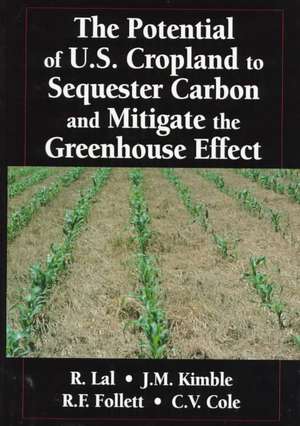The Potential of U.S. Cropland to Sequester Carbon and Mitigate the Greenhouse Effect
Autor John M. Kimble, Ronald F. Follett, C. Vernon Coleen Limba Engleză Hardback – aug 1998
Topics include:
The Potential of U.S. Cropland to Sequester Carbon and Mitigate the Greenhouse Effect provides an exceptional framework for the adoption of science-based management methods on U.S. cropland, encouraging appropriate agricultural practices for the sustainable use of our natural resources and the improvement of our nation's environment.
Preț: 819.62 lei
Preț vechi: 1102.63 lei
-26% Nou
Puncte Express: 1229
Preț estimativ în valută:
156.86€ • 163.15$ • 129.49£
156.86€ • 163.15$ • 129.49£
Comandă specială
Livrare economică 25 martie-08 aprilie
Doresc să fiu notificat când acest titlu va fi disponibil:
Se trimite...
Preluare comenzi: 021 569.72.76
Specificații
ISBN-13: 9781575041124
ISBN-10: 157504112X
Pagini: 144
Dimensiuni: 178 x 254 x 14 mm
Greutate: 0.44 kg
Ediția:New.
Editura: CRC Press
Colecția CRC Press
ISBN-10: 157504112X
Pagini: 144
Dimensiuni: 178 x 254 x 14 mm
Greutate: 0.44 kg
Ediția:New.
Editura: CRC Press
Colecția CRC Press
Public țintă
ProfessionalRecenzii
Mark Powell, Forestry and Natural Resource Management Unit, Winrock International, Morritlon, Arkansas
Cuprins
ObjectivesBasic ProcessesThe Greenhouse ProcessGlobal Trends in Greenhouse Gas EmissionsThe Role of Agriculture in U.S. Emissions of Three GHGsThe SOC Pool in U.S. Soils and SOC Loss from CultivationProcesses in Governing Emissions from the PedospherePlant ActionSoil ProcessesSoil QualityStrategies for Mitigating Emissions from CroplandU.S. CroplandSustainable Management StudiesSoil Erosion ManagementLand Conversion and RestorationConversion of Marginal LandRestoration of Degraded SoilsBiofuels for Offsetting Fossil FuelIntensification of Prime Agricultural LandConservation Tillage and Residue ManagementIrrigation Water ManagementImproved Cropping SystemsThe Carbon Sequestration Potential of Arable LandU.S. Cropland's Overall Potential to Mitigate the Greenhouse EffectTechniques for SequestrationRates of SOC SequestrationPossible Implementation ObstaclesRequired ActionConclusions - The Win-Win StrategyAgricultural Profits from Environmental ImprovementsSOC's Monetary ValueSOC's Environmental ValueGlobal PotentialAppendix 1: DefinitionsAppendix 2: Researchable Topics
Notă biografică
John M. Kimble, Ronald F. Follett;C . Vernon Cole
Descriere
This report assesses the potential of U.S. cropland to sequester carbon, concluding that properly applied soil restorative processes and best management practices can help mitigate the greenhouse effect by decreasing the emissions of greenhouse gases from U.S. agricultural activities and by making U.S. cropland a major sink for carbon sequestration. It provides an exceptional framework for the adoption of science-based management methods on U.S. cropland, encouraging appropriate agricultural practices for the sustainable use of our natural resources and the improvement of our nation's environment.
